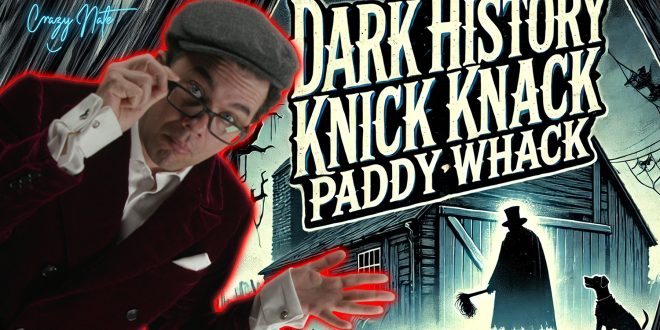Nursery rhymes are often associated with innocent childhood memories, playful tunes, and simple, catchy lyrics. However, some of these seemingly harmless rhymes have darker origins and hidden meanings that reflect historical events and societal issues. One such nursery rhyme is “Nick Nack Paddy Whack.” While it may sound like a lighthearted tune, its roots are entangled with a history of oppression, suffering, and resilience. In this article, we will delve into the true meaning behind “Nick Nack Paddy Whack” and uncover the dark secrets hidden within its verses.
Historical Context: English Conquest of Ireland
The story of “Nick Nack Paddy Whack” begins in 1171, when King Henry II of England declared himself Lord of Ireland, initiating centuries of English control over the Irish land and people. This period was marked by the construction of fortifications, the imposition of English laws, and the seizure of lands from the native Irish. The English occupation led to ongoing conflict and resistance from the Irish, who yearned for independence.
In the 16th century, the English intensified their efforts to control Ireland by encouraging English settlers to move to Ireland and take possession of the best agricultural lands. These settlers became landlords, renting the land back to the native Irish at exorbitant rates. The economic disparity grew, with the English landlords growing wealthier while the Irish struggled to survive.
The Irish Potato Famine
The situation worsened dramatically during the Irish Potato Famine of 1845-1852. The famine, caused by a potato blight, led to the death of over a million people and forced another million to emigrate in search of a better life. Despite the widespread starvation, Ireland continued to export large quantities of food to England, exacerbating the suffering of the Irish population. This paradox, where food was being sent out of the country while the locals starved, highlighted the deep injustices and harsh realities of English colonial rule.
The Origins of “Nick Nack Paddy Whack”
Amidst this backdrop of suffering and oppression, the nursery rhyme “Nick Nack Paddy Whack” emerged. The rhyme tells the story of an old man who “played knick-knack” on various parts of his body and gave a dog a bone. At first glance, the rhyme seems like a simple children’s song, but a closer look reveals a much darker meaning.
Knick-Knacks and Survival
During the famine, many Irish people were left homeless and desperate. They resorted to selling “knick-knacks,” small handmade items, to survive. The term “Paddy” was a common nickname for Irishmen named Patrick, and it was often used derogatorily by the English. When Irish peddlers came to English doors trying to sell their knick-knacks, they were frequently met with hostility and violence, sometimes being physically struck or “whacked” and sent away.
 “Give a Dog a Bone”
“Give a Dog a Bone”
The phrase “give a dog a bone” can be interpreted as a metaphor for the English giving the Irish the bare minimum needed to survive, or even the scraps from their own tables. During the famine, while the English landlords ate lavish meals, the Irish were left to starve or survive on meager rations. Some interpretations suggest an even grimmer meaning, where the English fed their dogs bones from the bodies of deceased Irish people, highlighting the brutal indifference of the English towards the suffering of the Irish.
Rolling Homes
The line “this old man came rolling home” refers to the nomadic lifestyle forced upon many Irish families. Unable to afford stable housing, they lived in caravans or “rolling homes” that were pulled by horses or even by hand. These mobile homes were a necessity for those displaced by economic hardship, symbolizing the extreme poverty and resilience of the Irish people.
The Dark Symbolism
The seemingly innocent nursery rhyme “Nick Nack Paddy Whack” thus encapsulates a dark chapter in Irish history. It reflects the economic disparity, oppression, and resilience of the Irish people during a time of great suffering. The rhyme’s playful tune masks a narrative of survival against the odds, where the Irish were forced to find creative ways to endure and resist the harsh realities of English rule.
Cultural Resilience
Despite the hardships, the Irish people demonstrated remarkable resilience and strength. The act of selling knick-knacks, though born out of desperation, also showcased the creativity and resourcefulness of the Irish. They adapted to their circumstances, finding ways to make a living and maintain their dignity in the face of adversity.
Modern Interpretations
Today, “Nick Nack Paddy Whack” is often sung without any knowledge of its historical context. It serves as a reminder of how easily the true meanings of cultural artifacts can be obscured over time. By uncovering the dark history behind the rhyme, we can gain a deeper appreciation of the resilience and strength of the Irish people, as well as a greater understanding of the complexities of history.
“Nick Nack Paddy Whack” is more than just a nursery rhyme; it is a reflection of a tumultuous period in Irish history marked by oppression, suffering, and resilience. The rhyme’s dark origins reveal the harsh realities of English colonial rule and the desperate measures taken by the Irish to survive. By understanding the true meaning behind the rhyme, we can honor the memory of those who endured and recognize the resilience that has shaped Irish culture.
As we sing these familiar tunes, it’s essential to remember and honor the histories they represent, acknowledging the pain and struggles of those who came before us. “Nick Nack Paddy Whack” is a story of endurance, resistance, and the indomitable spirit of a people who refused to be broken.
This has been Crazy Nate, diving deep into the hidden histories behind the songs we thought we knew. Until next time, keep smiling—they’re contagious.
 Crazy Nate Share a smile!
Crazy Nate Share a smile!










